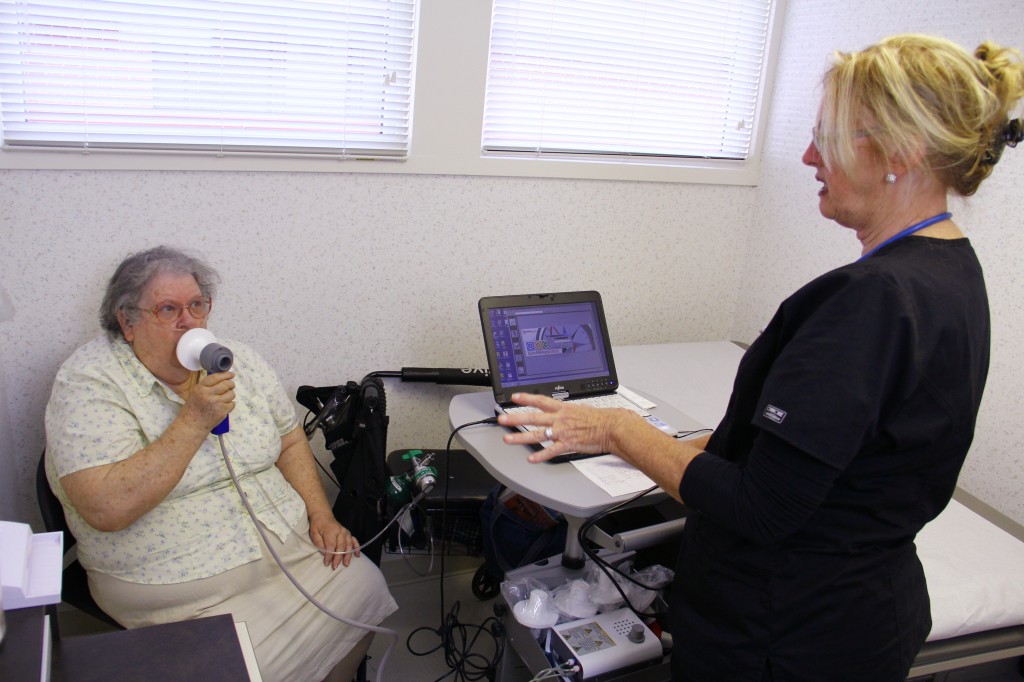 Lynchburg Pulmonary offers a comprehensive rehabilitation program for people with chronic lung diseases such as emphysema, chronic bronchitis, asthma, bronchiectasis and pulmonary fibrosis. The program includes medical management, education, emotional support, exercise, breathing retraining and nutritional counseling. The purposes of pulmonary rehabilitation are to help people lead full, satisfying lives and to restore them to their highest possible functional capacity. The specific goals of pulmonary rehabilitation are to improve quality of life by:
Lynchburg Pulmonary offers a comprehensive rehabilitation program for people with chronic lung diseases such as emphysema, chronic bronchitis, asthma, bronchiectasis and pulmonary fibrosis. The program includes medical management, education, emotional support, exercise, breathing retraining and nutritional counseling. The purposes of pulmonary rehabilitation are to help people lead full, satisfying lives and to restore them to their highest possible functional capacity. The specific goals of pulmonary rehabilitation are to improve quality of life by:
- decreasing respiratory symptoms and complications
- encouraging self-care and control over daily functioning
- improving physical fitness and exercise performance
- improving emotional well-being
- reducing hospitalizations.
Our Multidisciplinary Approach
Our pulmonary rehabilitation program involves physicians, nurses, rehabilitation therapists, psychosocial staff and dietitians all working together. These healthcare professionals evaluate the patient’s overall physical and emotional status and develop a customized program, working together as a team with the patient to take advantage of everyone’s expertise.
Improving Physical Activity
Physical conditioning activities are a key part of a pulmonary rehabilitation program. These activities improve the function of your heart and lungs and strengthen the muscles used for breathing. It is common for people with respiratory disease to limit physical activities because they fear becoming short of breath. When you become inactive, your muscle strength decreases and you may become weaker and at more risk for respiratory problems. Pulmonary rehabilitation enables you to pursue activities to the fullest extent of your abilities, to maintain physical fitness, and to help regain control of your breathing. Physical conditioning can take place individually or in a group setting. Activities may include walking, stationary bicycling, water exercise, simple aerobics, instructions in breathing and relaxation techniques, and conserving energy for many daily activities. Most people who exercise will also feel more confident.
Learning about Your Illness
Educational activities are an important part of a successful pulmonary rehabilitation program for both the patient and family. The education in any rehabilitation program may include written materials and group and individual classes. Videos and other visual aides may also be used. Individualized teaching sessions with a healthcare professional are also important to review medications, treatments, and care at home.
Learning to Cope
A variety of emotions, including anxiety and depression, can interfere with daily functioning and increase shortness of breath. Studies show that depression is common because of the limitations caused by the chronic respiratory condition. Psychosocial counseling can help you and your family to cope with the chronic illness. Classes on stress management, coping with chronic illness and relaxation exercises may be offered. Some rehabilitation programs may also have a support group for you and your family.
Improving Nutrition
Poor nutrition is common among persons with chronic lung disease. Shortness of breath and fatigue can interfere with your ability to eat a balanced diet. The amount and type of food, as well as the timing of meals can cause increased shortness of breath. The dietitian may provide counseling and group classes on healthy nutrition and food selection and preparation. Pulmonary rehabilitation programs offer practical suggestions for shopping, food preparation and eating. Individualized diet plans may be developed when problems such as fatigue, shortness of breath, swallowing, or poor appetite interfere with good nutrition.
